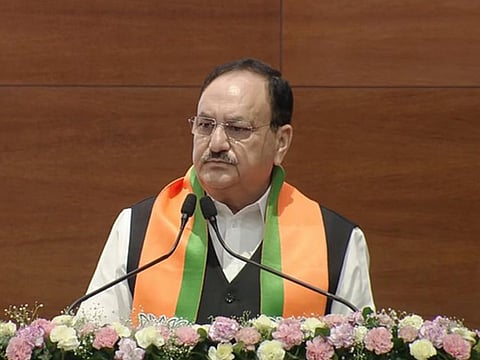

NEW DELHI: India has launched the world’s largest publicly funded health assurance scheme—the Ayushman Bharat Pradhan Mantri- Jan Arogya Yojana—said Health Minister J P Nadda on Monday. The scheme covers over 120 million families, providing an annual hospitalisation benefit of $6,000/family.
“This expansion will benefit around 45 million families, including 60 million elderly population, by providing them free health insurance coverage. It underscores the government’s commitment to ensuring universal and inclusive healthcare for India’s growing elderly demographic,” said Nadda at the 77th session of the Regional Commission of the World Health Organisation (WHO) Southeast Asia Region, which kicked off here. Nadda said the government has recently expanded the scheme to all citizens aged 70 years and above.
Recognising the growing public health challenges posed by non-communicable diseases (NCDs), he said, “India is implementing the National Programme for Prevention and Control of NCDs since 2010 to address conditions such as hypertension, diabetes and cardiovascular diseases. This initiative has led to the establishment of 753 NCD clinics, 356 Day Care Centers, and 6,238 Community Health Centers to focus on preventive measures at an early stage.”
India is poised to share its Digital Public Infrastructure such as Ayushman Bharat Digital Mission, e-Sanjeevani, Integrated Health Information Platform, SAKSHAM, etc. by providing technical and financial support through the Global Initiative on Digital Health—a WHO-managed network, he said.
“Following the remarkable success of CoWIN digital platform during the COVID-19 pandemic, India has conceptualized the online digital platform-UWIN, for the Universal Immunization Programme. The portal will register, track, and monitor all vaccination events,” Nadda added.
Understanding the role that traditional and complementary medicine plays across Southeast Asian member states, Nadda emphasised that India has backed WHO in creating the Global Traditional Medicine Centre, aimed at promoting these systems.
“India’s experience in integrating this system with the conventional system of medicine has led to the provision of holistic healthcare, promoting overall well-being and expanding the range of healthcare services,” Nadda said.
The WHO meet was attended by member nations, including Bangladesh, Bhutan, the Democratic People’s Republic of Korea, Indonesia, the Maldives, Myanmar, Nepal, Sri Lanka, Thailand, and Timor-Leste. The SEARO region has 11 member nations, including India.
WHO SEARO Regional Director Saima Wazed underlined that the best antidote for crises is cooperation and underscored the need for collaborative action to build on the public health gains and overcome new threats in the region.